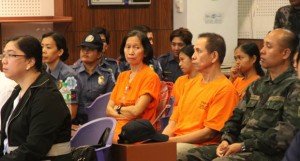MANILA, Philippines — Alleged communist leaders Wilma and Benito Tiamzon are asking the Supreme Court to reconsider its order to move the venue of their trial to the Philippine National Police (PNP) headquarters in Camp Crame.
The Tiamzon couple are facing charges for kidnapping and serious illegal detention.
Earlier, the High Tribunal granted the request of Quezon City Executive Judge Fernando Sagun Jr., who asked that the trial of the Tiamzons be transferred from the city’s Hall of Justice to the police camp following a massive rally of the couple’s supporters.
Last year, farmers and peasant groups trooped to the Hall of Justice in support of the accused and outnumbered the police stationed to secure the local court’s compound.
In its ruling, the Supreme Court also approved the installation of roll up-roll down metal doors, metal detectors and close-circuit television (CCTV) cameras at the Hall of Justice subject to a study on its cost estimate.
The Tiamzons, through the National Union of Peoples’ Lawyers (NUPL), told the High Court that they were deprived of their right to due process when they were not given the chance to present their side on the transfer of venue.
Their counsel Edre Olalia, citing their motion to the Supreme Court, said the protest action did not even disrupt proceedings at the Hall of Justice.
“They went nowhere near the steel doors, nor make any effort to do so. They did not threaten city hall employees and stayed a respectful distance from the court’s entrances,” the motion said.
“Clearly, there was overreaction to a valid exercise of a constitutional right by peasants who were simply expressing their views,” the motion stated. It added “a valid exercise of the freedom of expression cannot possibly be used to justify the denial to the accused-movants (Tiamzons) of their right to due process.”
The NUPL’s motion added that holding trial inside Camp Crame would not be consistent with the fair trial requirements of the Constitution. It claimed that lawyers of the Tiamzons, human rights groups and the media were barred from entering the camp.
Moreover, the motion said it was concerned about intimidation on lawyers and witnesses for the accused who are considered enemies of the State.
“Being surrounded by uniformed police officers … tends to create or result in intimidation and a hostile environment not conducive to effective and unhampered legal representation” by the counsels and witnesses, the motion said.
Ultimately, the motion said that there was no valid ground to move the trial to a police camp.
